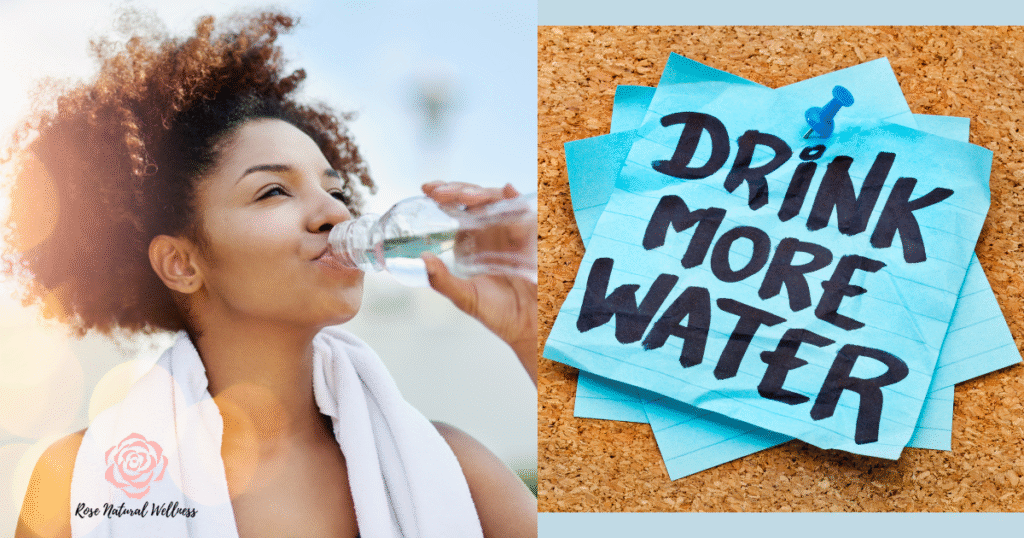
Hydration is one of the most overlooked but powerful tools for improving overall health. While most of us know we should drink water, we often underestimate just how deeply hydration impacts every system in the body—from our energy levels to digestion, focus, and even mood. At Rose Natural Wellness, we emphasize hydration as a foundational habit for wellness. It’s not just about avoiding thirst; it’s about giving your body the support it needs to thrive.
Whether you're navigating a busy workday, recovering from a workout, or trying to improve your daily nutrition habits, understanding how hydration works—and how to improve it—can make a big difference. Let’s explore the science behind hydration, how much water your body really needs, the role of electrolytes, and how to make better hydration choices every day.
Your body is composed of approximately 60% water. That water supports nearly every biological process, from transporting nutrients and oxygen to regulating temperature and cushioning organs. When we’re even slightly dehydrated—just 1 to 2 percent of total body water lost—we may experience fatigue, headaches, poor concentration, and slower physical performance.
Dehydration doesn’t always show up as extreme thirst. It can sneak up on you in the form of low energy, brain fog, dry skin, or frequent muscle cramps. That’s because even mild dehydration affects your body's ability to maintain optimal function. For those leading active or demanding lifestyles, being well-hydrated can improve stamina, mental clarity, and overall well-being.
Water does far more than just keep us from feeling thirsty. It plays a critical role in a variety of body systems, including:
When hydration is adequate, everything from your immune system to your energy levels operates more efficiently. On the flip side, dehydration can place unnecessary stress on these systems, leaving you feeling drained and sluggish.
The old standard of “eight glasses a day” is outdated and often insufficient—especially for active adults or those living in hot climates. A more personalized rule of thumb is to drink half your body weight in ounces of water each day. For example, a person who weighs 150 pounds would aim to drink at least 75 ounces of water per day.
Additional factors that may increase your hydration needs include:
It’s also important to note that thirst is a delayed signal. By the time you feel noticeably thirsty, you’re already behind on your hydration. Consistently sipping water throughout the day is more effective than trying to catch up all at once.
While water is crucial, hydration is more than just fluid intake—it’s about fluid balance. Electrolytes are minerals that carry an electrical charge and help your body regulate the balance of fluids in and out of cells. They also support nerve impulses, muscle contractions, and heart function.
The most important electrolytes include:
Electrolyte imbalances can occur when you're sweating heavily, recovering from illness, or drinking excessive water without replenishing minerals. That’s why it’s helpful to include natural sources of electrolytes in your diet—like bananas, leafy greens, coconut water, nuts, seeds, and dairy.
For individuals engaging in strenuous activity or prolonged time outdoors, adding a pinch of mineral-rich salt and a splash of citrus to your water can help restore electrolyte balance naturally.
Dehydration can look different from person to person, but there are some clear signs to be aware of:
Don’t wait for dehydration symptoms to worsen. Be proactive—especially during warmer months or when increasing your activity level.
Making hydration a habit is easier than you think. Try implementing these simple, sustainable strategies:
By pairing these tips with an awareness of how your body feels throughout the day, you’ll start to notice patterns in your energy, focus, and mood—and how closely they correlate with hydration.
You can also meet a portion of your hydration needs through your diet. Many fruits and vegetables are naturally rich in water and electrolytes, making them ideal additions to your meals and snacks.
Some of the most hydrating foods include:
These foods not only support hydration but also provide fiber, vitamins, and antioxidants that benefit your overall health.
Hydration isn’t just something to think about during a workout or on a hot day—it’s a daily practice that fuels every cell in your body. From boosting energy to enhancing mood, digestion, and brain function, water and electrolytes play a critical role in how you feel and function.
At Rose Natural Wellness, we emphasize small, meaningful habits that lead to big results over time. Drinking more water and eating more hydrating foods may seem simple, but they’re powerful steps toward supporting your body—naturally and sustainably.
If you’re working toward better health, start with something simple: refill your glass. Your body will thank you.